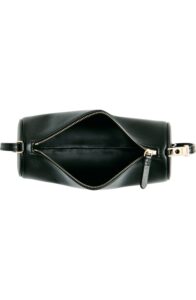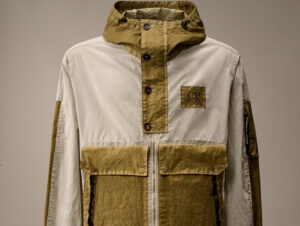In a world oversaturated by overstated logos and seasonal silhouettes, Proenza Schouler’s Mini Silo Shoulder Bag arrives like a whispered secret—quiet, cylindrical, and impossibly composed. It is a bag designed not to scream for attention but to earn it with the kind of elegance that defies the tyranny of trend. Presented here in a deep black Italian leather, the Mini Silo evokes the restraint of mid-century design, with its rigid cylinder form that feels both architectural and intimate.
A Quiet Geometry
To encounter the Mini Silo Shoulder Bag is to witness geometry in reverence: a perfect cylinder with symmetrical grace, void of unnecessary embellishment. The first impression it offers is not one of fragility but of intentional design—a bag that could roll away if it weren’t anchored by its own inherent confidence. When viewed from above, the zippered opening creates an elongated almond shape, bordered by golden teeth that punctuate the leather with understated polish. The zipper glides with a tactility that feels engineered, rather than stitched, as if machined for a museum showcase rather than commercial retail.
Its simplicity is a kind of protest. Where most modern bags are interrupted by monograms or eccentric detailing, the Mini Silo is monastic. It is shaped to honor the contents it may carry: a lipstick, a burner phone, a tightly rolled screenplay, or a passport stained with stamps. The interior is unlined, a raw reveal of craftsmanship, and its structure is firm enough to hold its shape even when emptied—like a sculpture awaiting narrative.
Form Meets Function
The proportions are thoughtfully scaled for the shoulder or elbow, suspended by a single strap of matching leather—neither too wide nor too narrow. It arches modestly, fastened by discreet gold-toned hardware that neither shimmers nor shouts. The strap itself attaches at each end of the cylinder with a looped tether, creating continuity between bag and body. There is no detachable crossbody option, no belt-convertible trickery. This is a bag that believes in its singular purpose. It is a shoulder bag, and it leans into that purpose with sartorial integrity.
Functionally, the bag opens wide thanks to the smooth curvature of its top-side zipper. It grants full access to its hollow chamber, lined in supple leather of the same hue. There are no inner compartments or extraneous dividers. In an era of partitioned minimalism, the Mini Silo retains an old-world honesty—what you see is exactly what you get.
A Signature Reduced to a Whisper
If one squints, the house’s insignia is barely visible: Proenza Schouler White Label is heat-stamped in fine metallic gold at the top center of the outer shell. It reads more like an archival seal than a brand shout, hinting at the atelier origins of Jack McCollough and Lazaro Hernandez’s design legacy. This bag doesn’t advertise; it earns respect through presence.
The use of Italian leather is more than a flex—it is a devotion to touch, wear, and time. It doesn’t gleam but rather absorbs light with a matte finish that recalls museum leather furniture or custom saddlery. Each edge is hand-painted, its curve uninterrupted, a demonstration of fine bag-making reduced to its platonic ideal.
An Accessory of Subversion
Perhaps what makes the Mini Silo Shoulder Bag so compelling is that it subverts its own category. It is not just an accessory but a proposition: what if a bag could do less, and mean more? What if the act of carrying a bag became less about utility or flash, and more about architecture in motion?
There is a latent surrealism in its form—its similarity to a baton, a pencil case, or a miniature drum. In the context of daily wear, it creates contrast: against flowing dresses, it is strict; against structured tailoring, it is sculptural. It has the silhouette of a vintage thermos or a modernist vase, and in that ambiguity, it becomes infinitely more wearable.
Wearer as Curator
Carrying the Mini Silo Shoulder Bag transforms its wearer from consumer to curator. There is a studied selectiveness to its capacity. It will not tolerate clutter. Instead, it demands curation—a few items, each intentional, housed in a shell of restraint. One must plan what enters its hollow chamber, knowing there is no room for frivolity.
Its presence in fashion editorials has already been notable. Worn with monochrome trousers or oversized coats, it never fights for attention but becomes a kind of visual punctuation. In motion, it swings subtly, rotating like a pendulum suspended from the axis of style.
Culture
Proenza Schouler’s White Label line—the more accessible extension of the mainline—rarely compromises. Here, in the Mini Silo, we see the distilled intelligence of the brand’s ethos: thoughtful construction, minimalist philosophy, and urban realism. It echoes the work of Donald Judd more than any influencer micro-bag. This is slow fashion made immediate, a utilitarian object rendered sacred.
It aligns with the resurgence of quiet luxury, but without the burden of class performativity. It’s not old money or new money—it’s idea money. The kind of object one buys not to showcase wealth but to quietly honor design, quality, and proportion.
Impression
In the poem of one’s wardrobe, the Mini Silo Shoulder Bag is a haiku. Small in structure, but large in implication. It holds space without demanding it. It exists as a possibility—of movement, of minimalism, of narrative potential. In a crowded room of maximalist statements, this bag whispers the loudest.
No comments yet.









